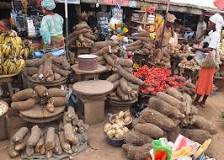John Nwokocha
An all-time high inflation has hit Nigeria’s food sector with a figure reaching 37.92 percent, representing 38 percent in the first nine months of President Bola Tinubu’s administration.
This is the latest food inflation index released by the National Bureau of Statistics (NBS).
Tinubu had met food inflation rate at 24.48 percent upon inauguration on May 29, 2023, but his introduction of a set of economic policies, including the removal of fuel subsidy, and floating of the Naira have quickly affected the purchasing power of food items.
As of today, the Naira is exchanging at N1,611.12 per 1USD.
Consequently, prices of food items have jumped up. Africa Health Report can confirm that the hike in prices is felt in all categories including bread, meat, fish, garri, yam, vegetable, oils, cereals, potatoes, fruit, coffee, tea, and cocoa, soaps, detergent, among others.
Data from the NBS report show that since 1999, no Nigerian president has weakened the purchasing power of food items in their first nine months of assuming office as Tinubu has done.
According to the NBS report, ex-president Olusegun Obasanjo had, between his inauguration and nine months, reduced food inflation from 5.68 percent to -15.8 percent; Goodluck Jonathan, upon inauguration and nine months, reduced food inflation from 16.31 percent to 10.26 percent.
Although ex-presidents Musa Yar’adua and Muhammadu Buhari increased inflation within their first nine months of assumption of office from 2.36 percent to 8.70 per cent, and 9.78 per cent to 11.38 per cent respectively, according to the NBS report, no president since the country’s return to democracy has increased food inflation in a fast pace and to the rate it is today, as Tinubu.
Meanwhile, the ‘Consumer Price Index and Inflation Report’ for February, shows a 1.80 per cent rise compared to the previous month’s figures.
The February 2024 headline inflation rate rose to 31.70 percent from 29.90 percent in January 2024, indicating an increase of 1.80 percent points, according to the report.
According to the data, Nigeria experienced a year-on-year increase in headline inflation rate from 21.91 percent in February 2023 to 9.79 percent in February 2024, as contained in the NBS’ report.
In February, the food inflation rate rose to 37.92 percent compared to the previous year, an increase of 13.57 percent from the rate in February 2023 (24.35 percent), as indicated in the report.
Africa Health Report observed that the spike in the cost of food items has led to protests in various parts of the country as well as necessitated vandalizing and looting of food warehouses across the country by frustrated Nigerians.



